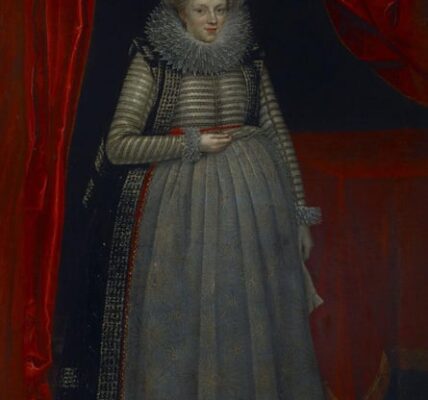13 TV shows that caused shock and controversy in Britain, ranging from the Post Office scandal to a potential nuclear attack.
G
Governments have long feared television, as shown by the numerous laws regulating its programming since its inception in the UK in 1936. These laws dictate the amount of airtime, timing, and content of broadcasts. While the official reasoning for this strict regulation is to protect viewers from negative effects such as mental decline and moral corruption, there is also a fear that TV may expose the questionable actions of the government.
This week, a dramatic television show on ITV called “Mr Bates vs the Post Office” caused chaos in Westminster as ministers rushed to pass laws to clear the names of over 700 sub-postmasters in the UK. These individuals were wrongly charged with fraud and theft from 1999 to 2015, thanks to accounting software implemented by the Post Office. This software resulted in numerous bankruptcies, divorces, mental breakdowns, and even deaths.
A significant change of events like this typically only occurs after a court ruling, and even then, there may be delays due to appeals and disagreements among government officials. However, in this instance, justice is expected to be served within a matter of weeks after the incident. This would mark Mr. Bates’ case against the Post Office as the most impactful program in the 88-year existence of British television.
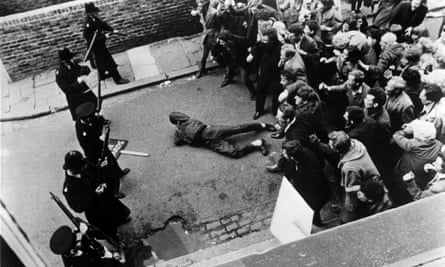
Gwyneth Hughes’ four-part drama – starring Toby Jones and Monica Dolan as accused Post Office employees – drew around 3.5 million viewers overnight (very high by current prime-time levels and with catch-up still to come), even beating the return of much-loved BBC One gameshow The Traitors; and more than one million signatures to a petition calling for former Post Office CEO Paula Vennells to lose her CBE (which she now says she will hand back immediately).
Because of the TV awards schedule, Mr. Bates vs the Post Office will not be eligible for Bafta awards until spring 2025. However, there is a strong argument for presenting it with a special trophy at this year’s ceremony, such as the Special Award for Outstanding Contribution to Public Knowledge. At the very least, ITV and Little Gem, the independent production company, should be recognized for their bravery in telling a story that is still ongoing. If any charges had been brought against individuals involved, ITV would not have been able to air the series until all trials were completed, which could have taken years. However, they were able to perfectly time the release of the series with the start of a criminal investigation.
The Mr Bates versus Post Office case is likely to be known as a program that had a greater impact on society than many politicians and lawyers could have predicted. However, what are the other potential contenders?
The TV program Cathy Come Home was produced by the BBC in 1966.
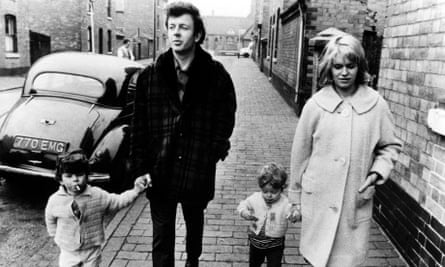
Ken Loach and Jeremy Sandford’s film portrays the story of a young couple who find themselves without a home due to economic struggles and greedy landlords. Some believe that this film was responsible for the creation of the housing charity Shelter, although it was actually planned to launch shortly after the film’s release. However, the film did spark discussions in Parliament and gained media attention, which ultimately led to the establishment of Shelter the following year. Despite the potential to end digital harassment from the Post Office, Loach has always emphasized that while Cathy Come Home raised awareness about the housing crisis, there has been little progress in finding a solution. Unfortunately, the issue remains just as pressing 58 years later.
The War Game (BBC, 1966)
Unusually among the most influential TV shows, Peter Watkins’ simulation of a nuclear attack on the UK – made at the peak of the cold war – was not shown for 19 years. BBC bosses feared it would show viewers the futility of preparations for armageddon and its physical reality: evaporating eyeballs, rats outnumbering people in the streets. Counterintuitively, the show’s banning – supposed to reduce mass panic – led Britons to suspect that atomic war must be even worse than they had thought.
In the spotlight: The story of Giuseppe Conlon and the Bomb Factory, as featured on BBC Northern Ireland in 1980.
Gavin Esler, who later became a Newsnight anchor and Change UK European parliamentary candidate, played a key role in casting doubt on the convictions of the Guildford Four and Maguire Seven. These groups consisted primarily of Northern Irish men who were imprisoned for their alleged involvement in pub bombings in London during the 1970s or for possessing terrorist materials. Through an interview with a person who had been released after serving a shorter sentence, Esler was able to raise questions about the validity of the evidence against those who were still incarcerated. As a result, all 11 individuals were eventually exonerated and received apologies and compensation.
Police reported a rape complaint on BBC Two in 1982.
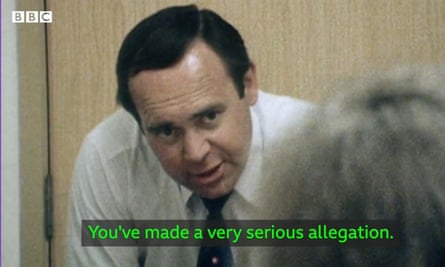
Documentary filmmaker Roger Graef encompassed both gentle and tough approaches in his work. He used his charisma to gain access to prisons and police stations, but was uncompromising when it came to presenting the facts in his edits. Due to the need for confidentiality and fairness, only the victims of sexual assault were aware of the harsh and disrespectful methods used by male police officers when questioning female victims. Graef’s acclaimed documentary Police shed light on the experiences of these women through subtle techniques such as blurring and cutaways. While there was no immediate legal action taken, the film did have an impact. In his later years, Graef reflected on the film’s influence, stating: “After three highly publicized rape cases, the police quietly altered their approach to handling these cases.” These changes, while not significantly improving rape conviction rates, included more sensitive collection of forensic evidence, increased staffing, and more impartial questioning.
The British television program, Crimewatch UK, aired on BBC One from 1984 to 2017.
As television documentaries and dramas began to uncover instances of police corruption, there was concern about a show that formed a partnership with law enforcement agencies. There were disputes over the show’s potential to mislead viewers into believing that Britain had a higher crime rate than it actually did, despite presenter Nick Ross’s cheerful sign-off of “Don’t have nightmares!” Additionally, there were concerns about the show’s ability to name individuals as suspects for pranks, whether they be friends or foes. However, for the victims of multiple murderers and rapists, this TV program brought about justice, potentially faster than if the police had worked alone.
Move beyond the advertisement for the newsletter.
after newsletter promotion
This television show, called “That’s Life!” premiered on BBC One in 1988.

Esther Rantzen can be credited for the safer playgrounds we see today. A report from her show in 1988 revealed the dangers of concrete and asphalt surfaces in playgrounds, which had resulted in multiple injuries and even deaths. This prompted new guidelines for councils, promoting the use of wood-chip and bounce-back floors, which are now mandatory. Thanks to Rantzen’s efforts, countless children have been able to leave the playground unharmed and ride home in a car equipped with rear seatbelts, another success from her TV campaigns.
What was the name of the TV show on ITV in 1990 called “Who Bombed Birmingham?”
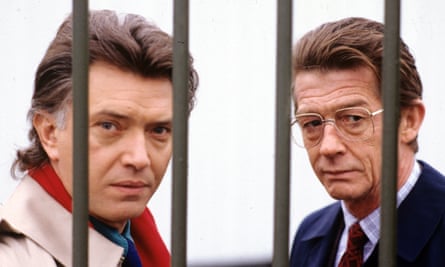
In 1975, six men were sentenced to life in prison for their supposed involvement in two pub bombings carried out by the IRA in the Midlands the year before. ITV’s World in Action aired documentaries, led by politician and writer Chris Mullin and producer Ian McBride, that raised doubts about the verdicts and highlighted the pressure on law enforcement and courts to declare success in the “war against terror”.
In 1990, McBride believed that the audience may have been tired of hearing about the story. He convinced Granada and ITV to produce a docu-drama about the case during primetime, with John Hurt playing Mullin and Martin Shaw playing McBride. A year later, all six convictions were reversed, possibly due to the increased exposure and emotional intensity of the drama. (Although there was also a one-hour documentary on ITV following Mr Bates vs the Post Office, it is unlikely that the documentary alone would have had the same effect.)
In terms of quashing – as now seems likely – hundreds of wrongful convictions, Mr Bates vs the Post Office may set the record for the number of people whose lives were directly and demonstrably transformed by a TV show, and still more so when compensation is paid. However, the 17 men involved in the cases of the Birmingham Six plus the Guildford Four and Maguire Seven (see above) received wrongful sentences of around 242 years. This makes the miscarriage of justice – and TV’s role in exposing it – the closest equivalent to this month’s ITV triumph.
The television series “Queer As Folk” aired on Channel 4 from 1999 to 2000.
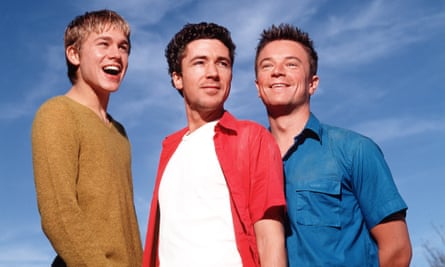
It is uncertain, but would the legalization of civil partnerships for same-sex couples in 2004 and gay marriage in 2014 in the UK have occurred without Russell T Davies’ groundbreaking two series on the queer community in Manchester? While there were previous shows about gay men, Davies’ series stood out for portraying their lives rather than just focusing on their struggles. The high ratings also eased concerns from newspapers and advertisers, proving that this was now a mainstream and potentially profitable topic.
The BBC Two documentary “Terry Pratchett: Choosing to Die” aired in 2011.
The topic of granting elective death to those who are terminally ill will likely be a major point of discussion in the coming years. Notable figures such as Esther Rantzen and Susan Hampshire have recently joined this cause, following in the footsteps of the courageous Terry Pratchett, a renowned fantasy author who faced the stark reality of death in a powerful documentary. In the film, Pratchett met with individuals who were planning to control their own exits and, having received a terminal diagnosis himself, explored the available options. Thanks to Pratchett’s efforts, this documentary has been credited with advancing the conversation surrounding the right to self-determination.
Care (BBC One, 2018)
Jimmy McGovern, a prominent figure in the British TV drama scene and known for his political opposition, crafted a compelling and intense play. The story revolved around a young woman (Sheridan Smith) navigating the struggles of the welfare system while her mother (Alison Steadman) suffers a stroke. The play’s portrayal of the breakdown of social care proved to be eerily prophetic when it became a widespread crisis two years later.
The Prime Minister’s announcement (across all platforms, 2020)
On March 23, 2020, Boris Johnson, the Prime Minister at the time, issued a directive for the majority of the population, approximately 27 million people, to remain in their homes for an indefinite period of time as the first Covid-19 pandemic lockdown began.
This important broadcast was delivered from the iconic 10 Downing Street, with the British Union flag displayed on the speaker’s left shoulder. The backdrop of open internal doors may have been strategically used to convey the message of increased ventilation. As a result of this brief speech, millions of people were advised to stay home from work or school the following day. The impact of this advice cannot be accurately measured, as it could have potentially affected the lives (either positively or negatively) of countless individuals. This broadcast is considered to be one of the most influential in British history, as it had the potential to greatly impact the largest number of people.
Despite the lack of preparation by the government for a viral outbreak, this aspect was adequately planned for. For many years, ministers and civil servants had worried about the possibility of a prime minister having to issue a televised stay-at-home order. They had anticipated that it could be due to a nuclear war or societal breakdown. However, the idea of a curfew speech had been considered and strategized since the events of The War Game sixty years ago.
Source: theguardian.com
